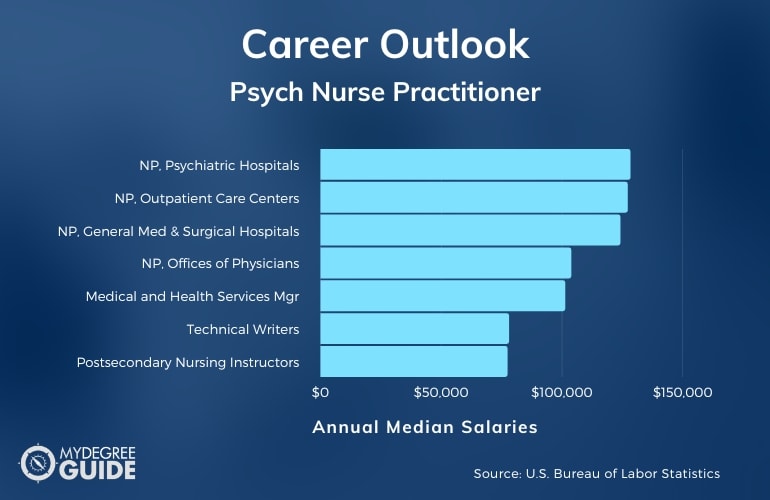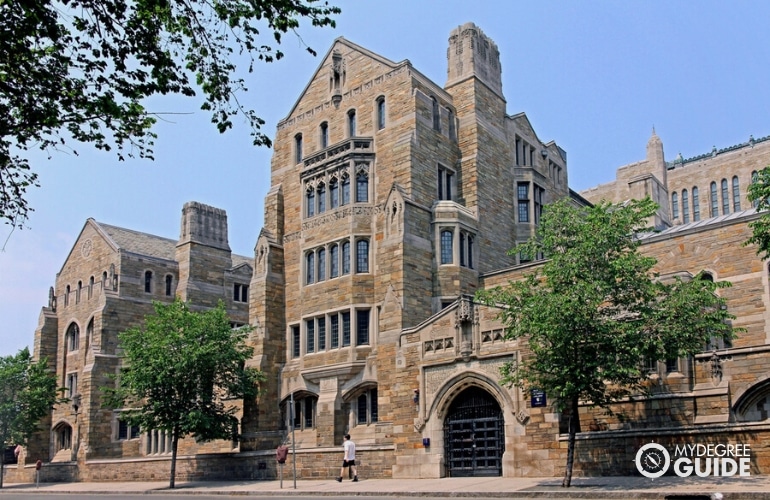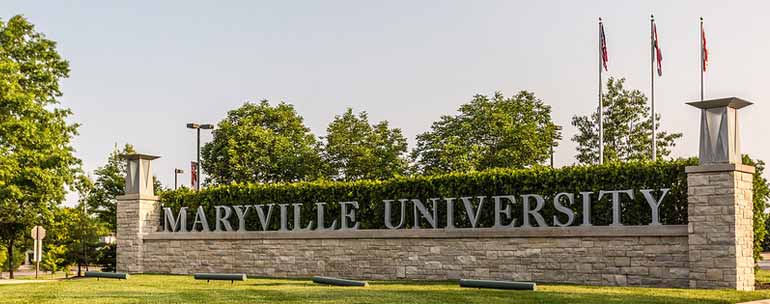If you are pursuing an advanced nursing career and have a passion for mental health, you might consider becoming a psychiatric nurse practitioner.
![Online Psychiatric Nurse Practitioner Programs [PMHNP]](https://www.mydegreeguide.com/wp-content/uploads/2023/01/best-online-psychiatric-nurse-practitioner-programs.jpg)
As a mental health NP, you could have a direct impact on your patients’ quality of life. Working as a nurse practitioner can also offer professional and personal benefits. Job growth in this area is bright, and salaries for these professionals are well above average.
Editorial Listing ShortCode:
Enrolling in a psychiatric nursing program is an essential step toward a lucrative and rewarding career as a psychiatric nurse practitioner.
Psychiatric Nurse Practitioner Programs Online

Psychiatric nurse practitioners have advanced training in psychiatric diagnosis and treatment. They often care for patients struggling with mental illnesses and substance abuse disorders, offer counseling services, and prescribe medications.
With such substantial responsibilities, it’s critical that psychiatric nurse practitioners are well-trained. Earning a master’s degree in nursing with a concentration in psychiatric NP helps you develop the necessary skills and knowledge to provide excellent patient care.
Some of the areas you can expect to study while pursuing your psychiatric nurse practitioner schooling include:
- Pharmacology
- Psychotherapeutic treatment
- Physiology
- Health assessment
- Health promotion
- Psychiatric diagnosis
- Disease management
In addition to coursework, psychiatric nurse practitioner programs require you to complete clinical hours and internships to ensure that you’re prepared to enter the workforce. These experiences also help you work toward certification and demonstrate to prospective employers that you are fully trained.
Editorial Listing ShortCode:
After completing your degree and earning certification, you can begin seeking psychiatric nurse practitioner positions with a wide range of organizations in healthcare and related fields.
Here are some of the most common employers of psychiatric nurse practitioners:
- Hospitals
- Psychiatric facilities
- Correctional facilities
- Clinics
- Private psychiatric offices
- Schools
- Trauma centers
- Long-term care facilities
- Government agencies
- Insurance companies
You may also opt for a career that does not involve direct patient care. This might involve working as a consultant or specialist who provides psychiatric expertise to attorneys, law enforcement, or researchers.
Some psychiatric nurse practitioners also find success writing for periodicals, blogs, and other publications related to mental health. MSN graduates who want to help train the next generation of nursing professionals can also seek teaching positions at postsecondary institutions.
Psych Nurse Practitioner Careers & Salaries

Psychiatric nurse practitioners are valued members of the medical field. After graduating with an MSN, you may be well-qualified for a position with a variety of healthcare employers.
Many nurse practitioners prefer working one-on-one with patients and do so while employed by hospitals, clinics, and private practices. Others prefer to focus on education, working either as postsecondary instructors or health coaches.
According to the Bureau of Labor Statistics, here are some potential career paths for graduates of mental health nurse degree programs.
| Careers | Annual Median Salaries |
| Nurse Practitioners, Psychiatric and Substance Abuse Hospitals | $128,360 |
| Nurse Practitioners, Outpatient Care Centers | $127,230 |
| Nurse Practitioners, General Medical and Surgical Hospitals | $124,200 |
| Nurse Practitioners, Offices of Physicians | $103,850 |
| Medical and Health Services Managers | $101,340 |
| Technical Writers | $78,060 |
| Postsecondary Nursing Instructors and Teachers | $77,440 |
| Social and Community Service Managers | $74,000 |
| Health Education Specialists | $60,600 |
| Substance Abuse, Behavioral Disorder, and Mental Health Counselors | $48,520 |
Data from the Bureau of Labor Statistics shows that job growth for psychiatric nurse practitioners is exceptionally strong. The projected growth rate for nurse practitioner positions over the next ten years is 46%, which is much faster than the average for all occupations.
Editorial Listing ShortCode:
With their high level of medical expertise, psychiatric nurse practitioners can also make contributions as medical or technical writers who create and contribute to blogs and journals. At times, organizations outside of the healthcare realm seek the expertise of psychiatric nurse practitioners. Legal offices, law enforcement agencies, and insurance companies sometimes hire these professionals as consultants.
Psychiatric Nurse Practitioner MSN Curriculum & Courses

Most nurse practitioner MSN programs, including online accelerated nursing degree programs, have a combination of courses focused on advanced nursing skills, management, and psychiatric treatment.
Common courses for these programs include:
- Foundations of Advanced Psychiatric Mental Health Practice: You’ll discover the history of psychiatric care as well as conceptual models and theories related to psychiatric practice.
- Advanced Psychological Care of Children and Adolescents: This class focuses on the treatment of children, adolescents, and families who are experiencing mental health issues.
- The Assessment and Diagnostic Process: In this course, you can develop interviewing, assessment, and therapy skills that can be applied when developing a strong relationship with patients.
- Psychopharmacology: Students in this course learn how to safely prescribe pharmacotherapeutics for chronic and acute mental health problems.
- Advanced Psychological Care of Adults and Older Adults: This course centers on strategies for providing mental healthcare to adults, older adults, and families, with a focus on psychotherapeutic treatment and community resources.
- Health Assessment: In this class, you can develop the skills necessary to provide direct patient care by collecting and analyzing patient data.
- Pathophysiology: This course helps prepare you to recognize disease states, evaluate symptoms, and identify disease progression.
- Evidence-Based Innovation: Students taking this course learn how to synthesize and disseminate evidence to promote innovation in healthcare systems.
- Leadership and Management: The focus of this class is developing leadership skills—such as financial management, human resources, and system performance—that are necessary to serve in a healthcare management position.
- Informatics: In this course, you’ll learn how to gather and analyze data in a way that positively transforms healthcare delivery.
In most cases, psychiatric nurse practitioner programs also require the completion of at least one internship.
How to Become a Psychiatric Nurse Practitioner

While earning a master’s degree is an essential step toward becoming a psychiatric nurse practitioner, it’s not the beginning or the end of the process. To reach this particular career goal, here are the common steps:
- Attend nursing school. You can begin your path toward becoming a psychiatric nurse practitioner by earning a bachelor’s degree in nursing from an accredited program.
- Pass the NCLEX-RN exam. Taking and passing the National Council Licensure Examination for Registered Nurses (NCLEX-RN) is a requirement for earning your licensure as an RN.
- Earn a PMHNP degree. As an RN, you can apply to Master of Science in Nursing (MSN) programs with a specialty in psychiatric mental health nurse practitioner (PMHNP).
- Complete clinical hours. Once you have finished your MSN degree, you can begin your clinical hours. To become certified, it’s necessary to complete a minimum of 500 hours through a relevant faculty-supervised program in a healthcare facility, such as a hospital or psychiatric office.
- Pass the board exam. The American Nursing Credentialing Center (ANCC) administers the psychiatric mental health nurse practitioner exam. You’re required to pass this exam before becoming licensed. Passing the exam earns you the credential of Psychiatric-Mental Health Nurse Practitioner — Board Certified, which is valid for 5 years.
- Apply for licensure. Your state may have additional requirements in place to obtain licensure, and you’ll provide evidence of your successfully completed degree, clinical hours, and board exam.
Becoming a certified psychiatric nurse practitioner is a remarkable achievement that is only possible if you earn an advanced degree and meet your state’s requirements for licensure.
Admissions Requirements

It’s often necessary to meet very specific admissions criteria in order to enroll in a psychiatric mental health nurse practitioner program. Common requirements include:
- Transcripts. You’ll provide official transcripts showing that you have a Bachelor of Science in Nursing.
- Test scores. Some programs require GRE scores, but others do not.
- References. You could ask former instructors and supervisors to describe your strengths.
- Personal statement. You can describe your career goals and interest in the program.
- RN license. You’re required to have a current license to practice as a registered nurse.
MSN programs may also require that you have a certain amount of professional experience or a minimum GPA for admission.
Accreditation

Choosing the right academic NP program involves a lot of factors, such as the accreditation status of your school. It’s strategic to attend a school that holds regional accreditation. Regional accrediting bodies are especially thorough when evaluating academic programs, which helps ensure that you receive a high-quality education.
Editorial Listing ShortCode:
Should you decide to change schools or pursue further education in the future after becoming an RN fast, courses from regionally accredited colleges tend to transfer more easily, like those earned from post-master’s PMHNP or FNP certificate online or on campus programs. In addition, when you apply for nurse practitioner certification, organizations like the ANCC only accept degrees from accredited programs.
Psychiatric Nurse Practitioner Licensure and Certifications

The licensure requirements for nurse practitioners can vary by state, but one of the common stipulations is that you obtain board certification.
Common criteria for certification as a psychiatric nurse practitioner include:
- Hold an active RN license
- Complete a CCNE or ACEN accredited psychiatric-mental health NP graduate program
- Meet clinical training requirements and complete clinical hours at an approved facility
- Pass certification exam
Some states have additional requirements to become a prescriptive authority, meaning that you are legally authorized to prescribe medication to patients.
Financial Aid and Scholarships

If you qualify, financial aid opportunities can help reduce the upfront cost of your degree. Filing a FAFSA is a common first step in the process.
By submitting information about your income, you can determine whether you are eligible for federal aid. Your state may also have grants or aid programs that can help cover your tuition. If you are currently working in healthcare, your employer may be willing to offer tuition assistance or reimbursement as a form of professional development. You could speak to your supervisor or human resources department to discover your options.
Scholarships are another source of aid for many students. You could look for scholarship programs designed for your particular field or circumstances. Online scholarship databases and the financial aid office at your prospective school could be helpful resources.
What Is a PMHNP Degree?

A psychiatric mental health nurse practitioner (PMHNP) degree is intended to guide registered nurses into a more specialized field of medicine. In addition to advanced nursing training, a PMHNP degree curriculum also focuses on the treatment of psychiatric disorders and illnesses.
Working as a psychiatric nurse practitioner requires extensive knowledge of pharmacology, psychiatry, and psychotherapy. Students in a PMHNP program participate in lectures, simulations, and clinical training to develop knowledge and experience in each of these areas. Some programs also allow students to further subspecialize in areas like treatment of adolescents or elder adults.
What Can You Do with a Psychiatric NP Degree?

Most graduates of a psychiatric nurse practitioner degree program go on to become practicing mental health nurse practitioners in a hospital, mental health facility, or other healthcare organization.
Some nurse practitioners work outside of direct healthcare. They might become educators and work as postsecondary nursing instructors. A psychiatric nurse practitioner MSN could also act as a foundation for a career as a nursing manager or medical writer.
Certified nurse practitioners who specialize in mental health may also serve as consultants for legal or law enforcement professionals. Their knowledge and experience in the medical field may make them well-qualified to offer testimony in legal cases.
What Is a Psychiatric Nurse Practitioner?

A psychiatric nurse practitioner is a nurse practitioner who has advanced training in mental health treatment. These medical professionals screen for, assess, diagnose, and treat mental illnesses and disorders. They also care for patients struggling with substance abuse and addiction.
The job tasks of a psychiatric nurse practitioner can include offering psychotherapy, researching and prescribing medication, developing and managing treatment plans, and offering mental health education. Some psychiatric nurse practitioners also have supervisory responsibilities. They may oversee a team of registered nurses or nursing assistants and help them provide high-quality patient care.
What Does a Psychiatric Nurse Practitioner Do?

Psychiatric nurse practitioners offer treatment to patients who are seeking help with mental health issues. They can diagnose and treat psychiatric problems, conduct mental health assessments, and lead group and individual therapy sessions.
In addition to offering direct care, psychiatric nurse practitioners can also help educate patients and their families about mental health and guide them in developing wellness plans. They may also collaborate with psychiatrists to create treatment and pharmacology plans.
Editorial Listing ShortCode:
Like any medical professional, psychiatric nurse practitioners must constantly ensure compliance with health laws and regulations. This involves keeping detailed records, maintaining strict confidentiality, and protecting patient data at all times.
Where Does a Psych NP Work?

Psychiatric nurse practitioners can seek positions with a large pool of potential employers. Healthcare organizations—such as long-term care facilities, hospitals, private practices, and clinics—all seek nurse practitioners with expertise in psychiatry.
Other types of organizations hire psychiatric nurse practitioners as well. These include correctional facilities, schools, universities, and domestic violence shelters. Government agencies and hospitals, such as the Department of Veterans Affairs (VA), are another possible avenue of employment. The VA has many patients in need of treatment for mental health problems like post-traumatic stress disorder, anxiety, and depression.
How Much Does a Psychiatric Nurse Practitioner Make?

Nurse practitioners typically earn above-average salaries. According to the Bureau of Labor Statistics, the annual median salary for a nurse practitioner is $120,680.
The type of employer you work for can have a significant effect on how much you earn. For example, nurse practitioners who work for psychiatric or substance abuse hospitals have yearly median earnings of $128,360. Meanwhile, those working in physician offices make a median of $103,850.
NPs who pursue an alternate career path may still make an above-average salary. The median annual salary for postsecondary nursing instructors is $77,440, and the median for medical and health services managers—including nursing managers—is $101,340.
How Long Does It Take to Get an Online MSN in Psychiatric Mental Health Nurse Practitioner?

The amount of time it takes to complete an online psychiatric mental health nurse practitioner MSN differs based on your circumstances.
Most programs require around 40 to 65 credit hours. These programs may take anywhere from 1 year to 3 years to complete if you attend full-time. Depending on the program and your availability, clinical hours may be completed during your program, which could extend your ultimate timeframe but get you closer to certification. Part-time students may need a longer amount of time to graduate.
What’s the Difference Between a Psychiatric Nurse Practitioner vs. Psychiatrist?

Psychiatrists and psychiatric nurse practitioners both play critical roles in the mental health field, but here are some key differences between them:
- Credential: A psychiatrist is a Doctor of Medicine (MD), whereas the minimum educational requirement for a nurse practitioner is a Master of Science in Nursing (MSN).
- Supervision: Some states require psychiatric NPs to work under the supervision of a psychiatrist, whereas psychiatrists do not require supervision.
- Earnings: Because they must graduate from medical school, psychiatrists tend to earn substantially more than nurse practitioners.
In a practical sense, the jobs of psychiatrists and psychiatric nurse practitioners can have substantial overlap, but academic requirements and professional credentials distinguish the two positions.
Is an MSN in Psychiatric Nurse Practitioner Worth It?

Yes, an MSN in Psychiatric Nurse Practitioner is worth it for many professionals. Earning this degree can help you work toward NP certification and qualify for positions with strong potential for growth and advancement.
Editorial Listing ShortCode:
According to the Bureau of Labor Statistics, the demand for nurse practitioners is extremely high, outpacing most other fields. Employment for these professionals is expected to grow by 46% over the next ten years. Mental health treatment has become increasingly accepted and encouraged, making high-quality treatment more in-demand than ever.
A career as a psychiatric nurse practitioner can enable you to positively affect your patients’ overall well-being.
Universities Offering Online MSN in Psychiatric Nurse Practitioner Degree Programs
Methodology: The following school list is in alphabetical order. To be included, a college or university must be regionally accredited and offer degree programs online or in a hybrid format.

Drexel University offers an online program for a Psychiatric Mental Health Nurse Practitioner MSN for part-time students.
Classes include synchronous meetings, and the program features several on-campus intensives and a clinical practicum. Students must have Pennsylvania RN licensure before beginning the practicum. Potential courses include Quality and Safety in Healthcare, Research Methods and Biostatistics, and Advanced Pathophysiology.
Drexel University is accredited by the Middle States Commission on Higher Education.

Franklin University offers an MS in Nursing—Psychiatric Mental Health Nurse Practitioner. The program requires the completion of 42 credit hours and can potentially be finished in 28 months.
Franklin’s online courses use simulation software to provide a dynamic learning experience. Potential courses in the program include Evidence-Based Practice and Quality Improvement, Health Policy, and Neurobiology and Psychopharmacology.
Franklin University is accredited by the Higher Learning Commission.

Gonzaga University’s Psychiatric Mental Health Nurse Practitioner MSN program requires the completion of 47 credits and 660 clinical hours. Coursework is primarily delivered in a flexible online format, but students are required to come to campus for five immersion experiences. Core courses are 8 weeks long, and specialty courses are 16 weeks long.
Gonzaga University is accredited by the Northwest Commission on Colleges and Universities.

Herzing University offers an online Mental Health Nurse Practitioner program that can typically be completed in 2 years. There are multiple start dates offered each year, and pathways for those with an ADN or ASN and those with a BSN. Students in the program can receive step-by-step support in finding a site for clinical placement.
Herzing University is accredited by the Higher Learning Commission.

Marymount University offers an MSN-PMHNP. The program is mostly online but does require one on-campus residency. It also requires the completion of 750 clinical hours. The program offers assistance in finding a clinical placement site locally. Previous graduating classes have had a 100% pass rate on AANP and ANCC exams.
Marymount University is accredited by the Southern Association of Colleges and Schools Commission on Colleges.

Maryville University has an online Psychiatric Mental Health Nurse Practitioner program. Coursework is available at any time to allow students to work around their own schedules. The program doesn’t require campus visits, and clinicals may be completed locally. Potential courses in the program include Theoretical Foundations of Nursing Practice, Evidence-Based Practice in Nursing, and Health Care Policy.
Maryville University is accredited by the Higher Learning Commission.

Ohio University offers a Psychiatric Mental Health Nurse Practitioner MSN that can be earned online. The program requires the completion 38 credit hours, including a 500 hour practicum, and is designed to be completed on a part-time basis across 6 semesters. New students may begin once a year in the summer.
Ohio University is accredited by the Higher Learning Commission.

Regis College’s MSN-PMHNP program usually takes 28 to 36 months to complete. The program is designed to be highly flexible, and coursework is offered 100% online. Potential courses include Health Assessment, Nursing Theory, and Advanced Pathophysiology. Graduates of the program are qualified to sit for the ANCC certification exam. Regis graduates have a pass rate over 90%.
Regis College is accredited by the New England Commission on Higher Education.

Simmons University has an online Psychiatric Mental Health Nurse Practitioner program that can potentially be completed in 2 years. The program requires the completion of 47 credits, one immersion experience, and a minimum of 672 clinical hours. The curriculum emphasizes social justice and health equity in the treatment of psychiatric issues.
Simmons University is accredited by the New England Commission of Higher Education.

St. Thomas University offers an online program for a Psychiatric Mental Health Nurse Practitioner MSN. It requires the completion of 50 credit hours and 500 clinical hours and can potentially be finished in 1.5 years. The program can be enrolled in full-time or part-time. The program offers assistance in finding a site for clinical placement.
St. Thomas University is accredited by the Southern Association of Colleges and Schools Commission on Colleges.

Walden University’s Psychiatric Mental Health Nurse Practitioner MSN program can potentially be finished in 2 years. Courses in the program use virtual simulations and discussions to create an engaging experience. The program offers personalized support in finding clinical placement and completing its required practicum. Graduates are eligible to sit for the ANCC exam.
Walden is accredited by the Higher Learning Commission.

West Coast University offers an online MSN-PMHNP degree program. It is designed to be highly flexible and offers multiple start dates throughout the year. Coursework and an online library are accessible all day, every day. The program requires two weekend intensives on campus and a 500 hour clinical practicum so students can receive hands-on training.
WCU is accredited by the WASC Senior College of University Commission.

Western Governors University offers an MSN—Psychiatric Mental Health Nurse Practitioner program intended for working students. The program usually takes 2.5 years to complete. The curriculum consists of courses such as Professional Presence and Influence and Psychopharmacology for Advanced Psychiatric Mental Health Practice.
Western Governors University is accredited by the Northwest Commission on Colleges and Universities.

Wilkes University offers an MSN-PMHNP degree online. The program offers support in finding clinical placement. Potential courses include Advanced Pathophysiology, Diagnostic Reasoning for Nurse Practitioners, and Advanced Health Assessment. Wilkes graduates have a consistently high pass rate on board exams.
Wilkes University is accredited by the Middle States Commission on Higher Education.

Yale University’s online MSN-PMHNP program requires the completion of 52.5 credit hours. Classes are conducted in live, virtual meetings, but the program also requires some on-campus immersion experiences. Clinical hours may be completed locally. The program is designed to be completed in 3 years.
Yale University is accredited by the New England Commission of Higher Education.
Getting Your MSN in Psychiatric Nurse Practitioner Online

Nurses who want to advance their careers and specialize in mental health treatment can benefit from enrolling in an MSN in PMHNP program. Earning an advanced degree is a key component of becoming a licensed and certified psychiatric mental health NP.
Psychiatric nurse practitioners play a similar role to psychiatrists without the commitment of medical school. If you want to improve the lives of patients by providing mental health treatment, you can begin by earning an advanced degree in this specialty.
You can take your first step toward this rewarding career by researching accredited online psychiatric nurse practitioner MSN programs.

